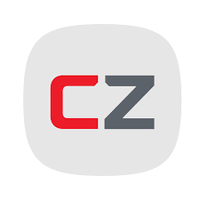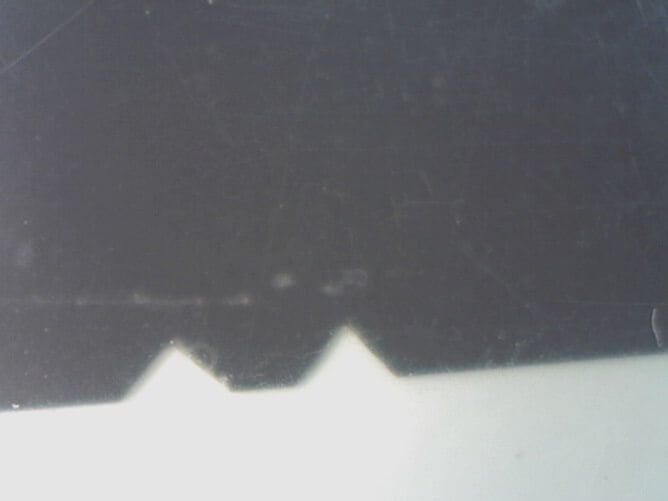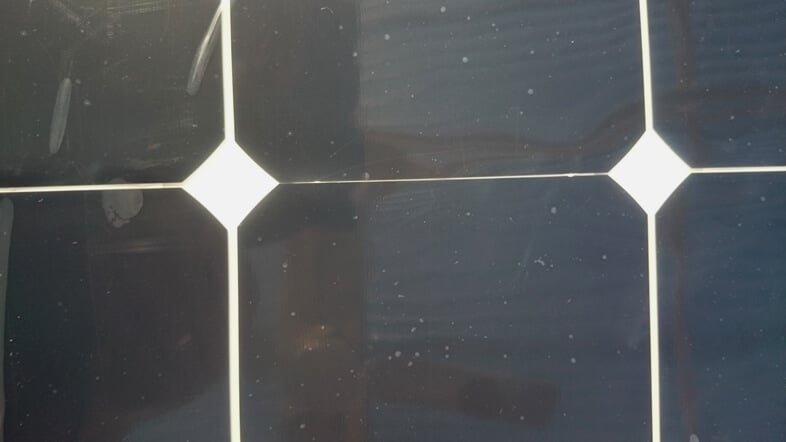How to Compare Good and Bad Flexible Solar Panels
Author: Solar 4 RVs
How to buy the best lightweight, flexible solar panels for a caravan or boat?
You want your purchase to meet your expectations and provide value for money.
The problem is there are many claims about flexible solar panels and it can be difficult for a consumer to know what is accurate and what is misleading.
This guide aims to assist you in your decision making so you can make an informed choice.
Facts you MUST know before buying flexible marine or RV solar panels
It is in our best interest that both the public and businesses have a positive experience with flexible solar panels, and that will only happen if customers are happy with their purchase.
Just because a website claims they have the 'best' solar panels does not mean you will get quality products and accurate information so 'Buyer Beware'! We want you to avoid the pitfalls when buying flexible solar panels so you are not disappointed after your purchase.
Solar 4 RVs engineers are committed to providing accurate and honest information and undertakes extensive research and testing.
Are you only comparing prices?
The price can be a good indicator of the quality of the panels. If the price is too good to be true then it probably is too good to be true!
We constantly receive many proposals from Chinese manufacturers that offer cheap panels. This can be very tempting for sellers of solar panels as it means they can achieve a better profit margin. However, you get what you pay for so customers need to balance the risk of buying cheaper flexible solar panels against the purchase price.
Flexible solar panels can be offered by Chinese manufacturers at a cheap price because they are mass produced with low cost cells and materials and minimal quality control checkpoints.
Possible issues that could be encountered when purchasing cheap flexible solar panels:
- overlapping cells;
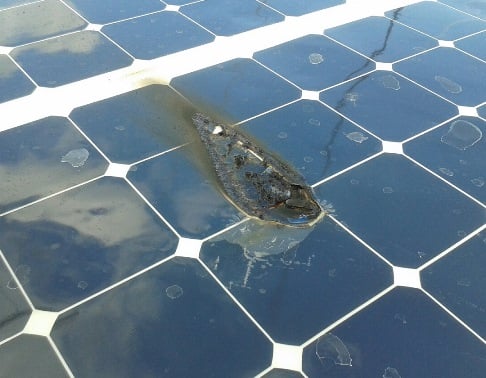
- damaged cells;
- inferior cells (are you really getting SunPower cells? see information below);
- sharp edges;
- inadequately sealed junction boxes allowing corrosion from water, particularly sea water;
- zinc plated fixings in the junction box which corrode with moisture;
- inferior by-pass diodes fitted or not fitted at all.
Getting quality lightweight flexible solar panels
It's not WHERE they are made that is important - it is HOW they are made
The majority of flexible solar panels are made in China even if the seller doesn't declare this and refers to 'cells' as being made in the US. There are many manufacturers in China and they produce various grades of solar panels and then on-sell them through pro-active marketing campaigns and email cold-calling.
If a supplier carries small quantities of stock, they are unlikely to have been manufactured in separate production runs to specific quality requirements. They will probably be off-the-shelf stock.
Solar 4 RVs does not purchase unknown ‘grades’ of panels and in fact we do not purchase any panels from standard manufacturing runs.
Our eArc flexible solar panels are made in China by Sunman. eArc solar panels utilise new waterproof composite polymers and panel structure. The development of this technology was accelerated by funding of $3.3M from the Australian Renewable Energy Agency (ARENA) to achieve the same durability as conventional solar panels.
Solbian solar panels are made in Italy.
All our flexible solar panels are all tested during production.
Flexible solar panel testing during production
During production all our solar panels are subjected to testing:
• Electrical testing, i.e. voltage and current; plus
• Electroluminescence (EL) testing.
The electrical test confirms the current and voltage are within production limits while the EL test confirms that the cells are free of defects and are well matched. If present these result in a lower panel output and possibly a shortened lifespan.
During the EL test a current is passed through the panel which turns part of the current into short-wave infra-red (SWIR) light at a wavelength of around 1150nm, i.e. the panel will “glow” with invisible infra-red light. A photo of the “glowing” panel taken by a special camera will show up micro-cracks or other defects in the cells and any significant mismatch between cells.
These issues are only visible with this EL test. The first of the following three images show a very poor quality panel with many defective cells. The second image shows up significant mismatches between cells, i.e. the intensity of the glow is related to the efficiency with which the cell will convert sunlight into electricity. The third image shows a panel free of cell defects and with only small variations in cell efficiency.

All solar panels that we stock undergo these tests.
Are you really getting genuine SunPower cells in your flexible solar panel?
SunPower has a reputation for producing the highest efficiency cells. They are widely used in rigid, framed, glass topped solar panels for residential and commercial settings.
At around 22% SunPower cells have one of the highest efficiency of any available cell on the market. A solar panel assembled from these cells has an overall efficiency around the 20%, with the 2% loss being attributable to the inter-connections and the slight opacity of the top layers. We have seen some websites claim efficiencies of 22% for a panel, but this is an exaggeration.
Solbian has certification from SunPower that confirms they obtain genuine SunPower cells.
Many flexible solar panels sellers state their products have SunPower cells. How can you tell you are getting the real deal?
- The SunPower company provides certification to the manufacturer when they supply them with SunPower cells. Even if their manufacturer does have certification it doesn't necessarily mean ALL their panels are manufactured using SunPower cells. This is because manufacturers make and sell different grades of solar panels at different price levels depending on quality.
- The SunPower company limits the size of flexible solar panels manufactured using their cells to 150W. The failure rates for larger panels increases due to mechanical and thermal stresses on the panel. If you see larger sizes of flexible solar panels claiming they have SunPower cells then questions about the accuracy of the claims need to be raised.
- SunPower cells are expensive to buy and manufacturers need to pass on these costs so if a flexible solar panel is very cheap then it is highly unlikely they contain genuine SunPower cells or they may contain 'seconds' or low grade cells.
Solbian SP solar panels use MAXEON GEN III SunPower cells, the latest technology and highest efficiency available.
Buying cheap flexible solar panels can be very costly!
Cheap flexible solar panels can work out to be a very expensive purchase!
You may find the price of some flexible solar panels on-line tempting but if the panels you receive have defective and chipped cells or junction boxes that will corrode quickly you are not really getting a bargain. You really do get what you pay for.
Cheap panels may only last a very short time before they fail and when the warranty is not honoured you will be left out of pocket. Removing the panels and trying to negotiate replacements has proved to be frustrating for many consumers.
If you are one of the many who think there is not much difference between flexible solar panels on the market - think again.
Issues you may encounter when buying cheap flexible solar panels
Really cheap flexible solar panels are made in a manner that keeps costs to minimum using a mixture of various cheap low grade cells, usually seconds. Individual cells are graded for quality at the time of manufacture. Good quality solar panels only use high-grade cells, while cheaper panels use lower grade cells, or a mix of different grades cells to keep costs down. You can tell this by an inconsistency in the colour of the cells across the one panel. Cells that are seconds may have cracks, chips and damaged surfaces.
The junction boxes where the positive and negative cables connect with the panel and where the bypass diodes are fitted requires careful soldering and sealing with heat conducting sealant to prevent corrosion and to dissipate heat from the diodes. Junction boxes in cheap panels rarely have more than one diode and are usually not sealed. Moisture will quickly corrode the junction box internals when sealant is not applied.
The encapsulation layers are usually made from the cheapest materials available and may come apart, fade or warp over time.
The completed panels rarely go through quality control and testing prior to shipment.
.JPG)
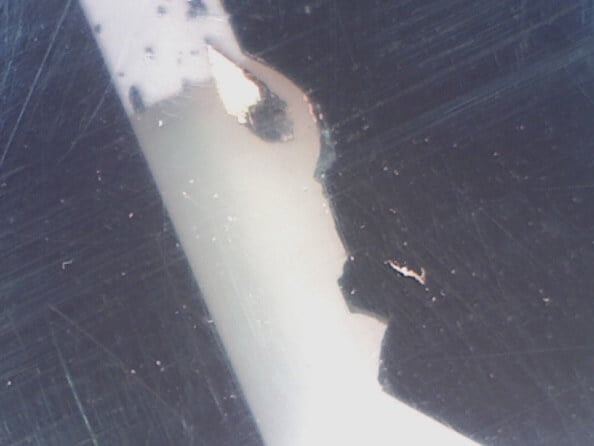
Images of damaged cell edges
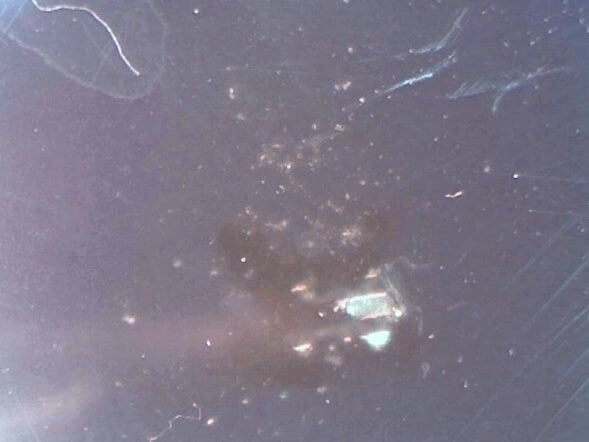
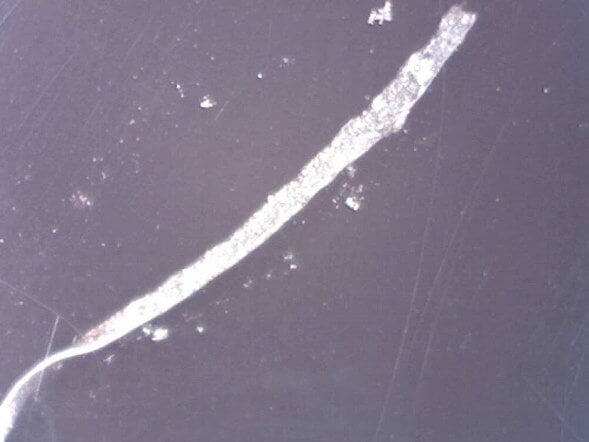
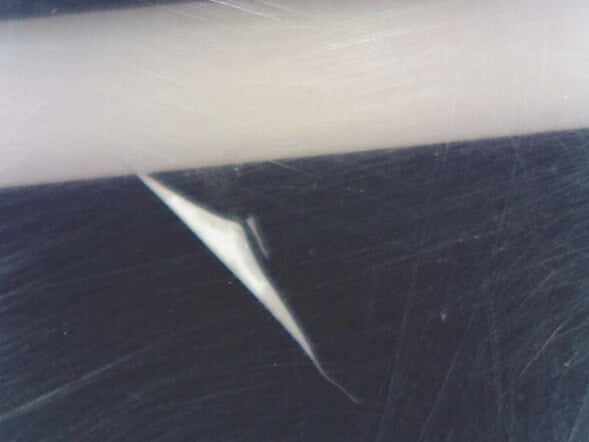
Images of damaged cells that are probably seconds (to keep the costs down)
Image of various widths of spacing between cells
Warranties not honoured
When the cheap panels fail the biggest frustration is usually the inability to obtain relacements under warranty. Often the seller is not contactable or finds a reason not to honour the warranty. In the rare instance that a replacement is provided it generally fails as quickly as the first purchase.
Meanwhile the time and effort to remove the faulty panel(s) and re-install replacements is time-consuming and costly.
Sellers of cheap solar panels can have a tendency to change their business name frequently and then continue to operate using different email addresses.
Case Study - Solar panels used by caravan manufacturer
We were asked to visit a caravan manufacturer as they were having a very high failure rate with a well known cheap brand of flexible solar panels and they wanted an alternative.
Customers complaints about the solar system failing was not good for their caravan brand reputation. The time, effort and cost in replacing the panels was significant.
When our engineer was there, they pulled a new panel from out of its packaging from the stock they were using so it could be examined. The panel photographs below were taken from that one unused panel.
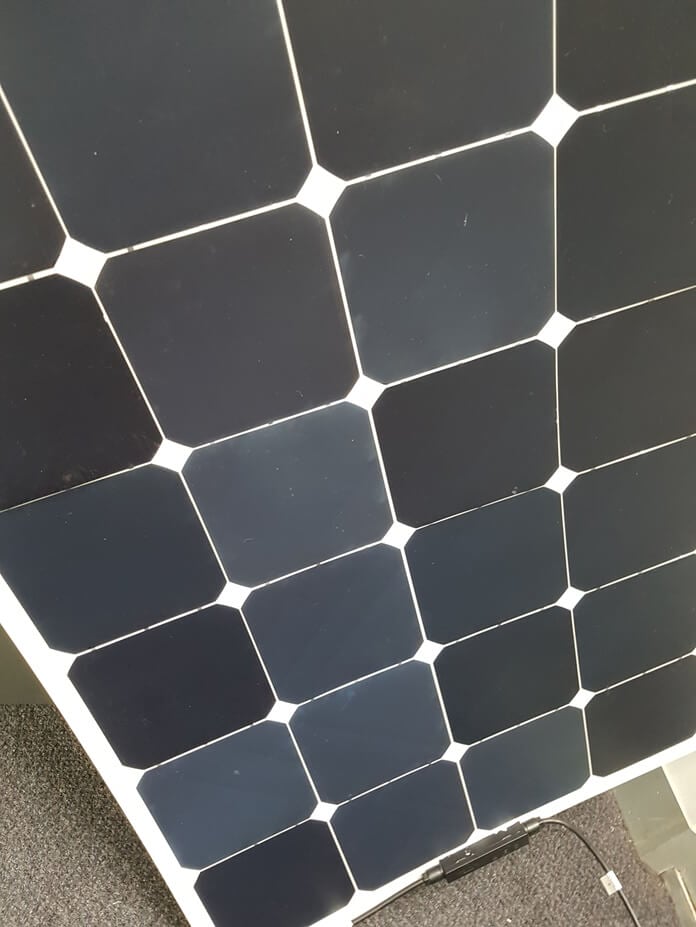
Image of the solar panel - it is made up of an inconsistent colour solar cells, possibly seconds.
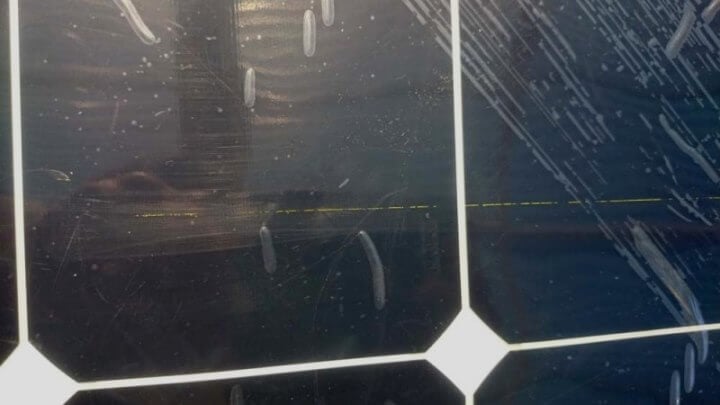
Image of yellow line through cells possibly caused by drum roller during manufacture
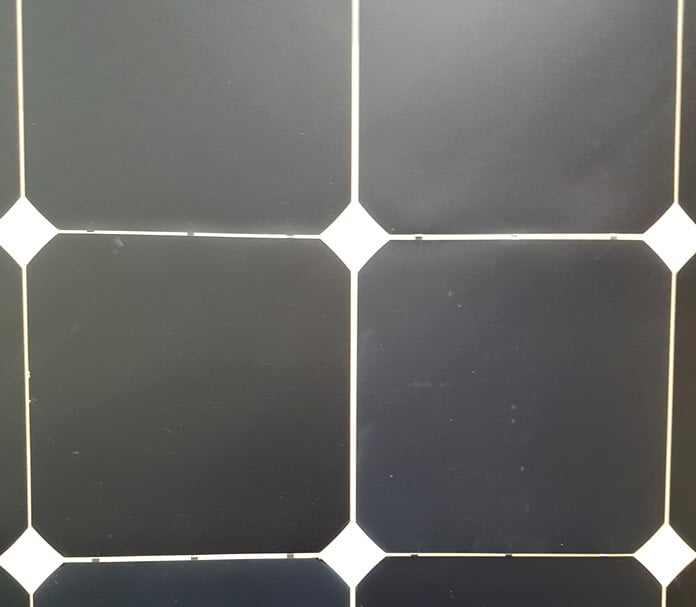
Image of various spacing widths between cells
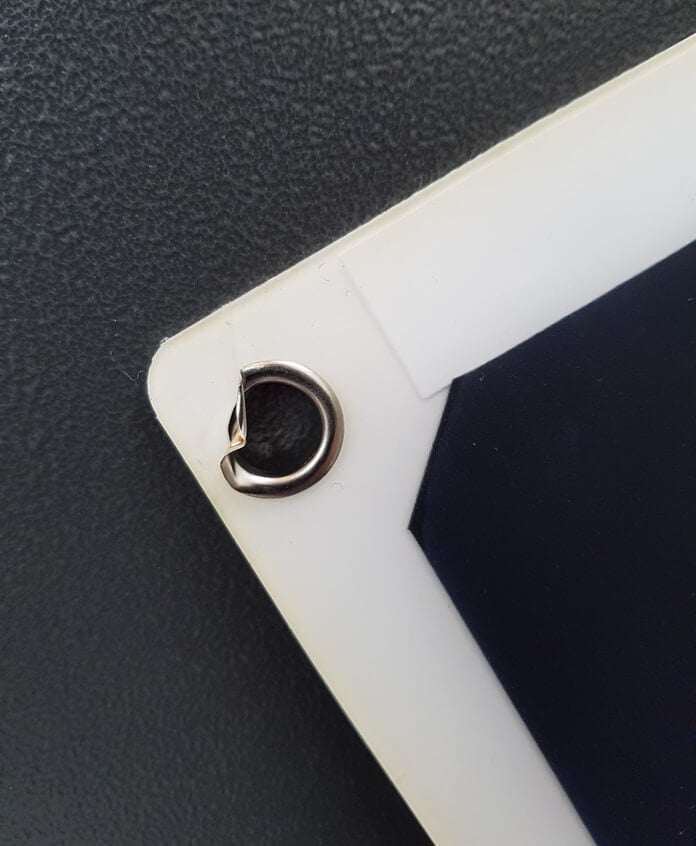
Image of eyelet incorrectly fitted
.jpg)
Image of poor soldering in the junction box.
The junction box edge has been damaged (partly melted) by the soldering iron which means the junction box lid does not seal properly. There is also no sealant over the connections. This means humidity or moisture will rapidly cause corrosion and failure.
Only one bypass diode is used.
Comparison to lightweight solar panels that Solar 4 RVs sells
Only high grade solar cells are used.
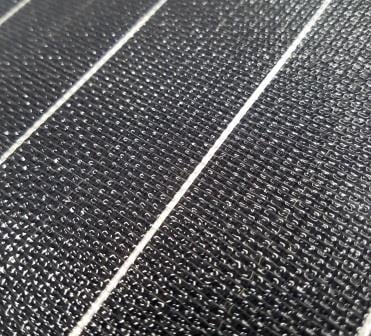
Our lightweight solar panels have the latest technology encapsulation methods for durability and toughness, yet they are only 2mm thick!
Junction boxes that have two bypass diodes, and are properly soldered and sealed to prevent corrosion from moisture

The entire junction is sealed prior to the lid going on to prevent corrosion from moisture.
After undergoing Electrical testing and Electroluminescence (EL) testing all our panels get a tamper-proof serial number, usually found under the top lamination so the manufacturer can refer back to it for warranty claims and trace performance back to the test data.
Accreditations, certifications and standards - don't be misled
ISO9001 Quality Accreditation
According to ISO9001, “This standard is based on a number of quality management principles including a strong customer focus, the motivation and implication of top management, the process approach and continual improvement." Using ISO 9001 helps ensure consistent, good quality products and services so we are confident our manufacturer is quality focussed.
However, a quality focus with policies, procedures and documents in place does not realistically ensure every product off a production line will be of high quality. Customers need to be aware that it is a good indicator of quality but it is not a checklist for product quality or an endorsement of the quality of a particular product.
Australian and International Standards
The international standard for performance testing of crystalline (both mono and poly crystalline) PV panels is IEC-61215. Certification to IEC-61215 is a pre-requisite for PV panels to be used in residential applications in Australia, but is NOT for PV panels on other structures such as caravans and boats. eArc solar panels are the only lightweight solar panels that have this certification as they are approved for installation on buildings.
The primary standard covering solar panels in Australia is AUS/NZ 5033 Installation and safety requirements for photovoltaic (PV) arrays which references several international standards covering testing and certification of solar panels. Subject to the specifics in the standards, panels that are installed onto buildings and ground installations must be certified to the standards, and in addition, for the Renewable Energy Certificates (RECs) the panels must also be listed in the Clean Energy Council (CEC) register of certified panels. eArc solar panels are the only lightweight solar panel accredited by the Australian Clean Energy Council.
Generally, for panels installed into mobile situations the panels do not need the certifications as mentioned in AUS/NZ 5033, however all products must still conform to all the overarching standards that apply in order for a product to be sold in Australia. These are similar to the requirements for CE marking in Europe.
If a company claims that their flexible solar panels conform to the Australia Standard then it would be pertinent to investigate further into the credibility of their claims.
CE Mark
Our panels carry the CE Mark which is a mandatory mark for certain product groups, including solar panels and electronic products, in order for them to be sold in the European market. The requirements are set out in European Directives (similar to Australia’s Regulations and Acts) that cover health, safety and environmental protection legislation.
The use of the CE mark indicates self-certification by the manufacturer that the device meets the minimum European Union requirements for Electro Magnetic Compatibility (EMC) compliance.
The CE mark has nothing to do with the quality, performance and longevity of the panel. CE is the abbreviation for the French phrase "Conformité Européene", i.e. in English "European Conformity".
Flexible solar panel warranties - will they be honoured?
Is there only mobile phone contact? Sellers of flexible solar panels without any infrastructure or bricks and mortar can easily shut down when warranty claims for cheap panels become an issue.
Who can you trust?
Anyone can set-up a website and claim they are experts or leaders in the field, even if they are unqualified and selling a few panels out of the garage, but do they really have the knowledge required? With flexible solar panels becoming popular there are many people starting up webshops to sell them online.
Solar 4 RVs is a multi-award-winning company that is publicly acknowledged as the leader in lightweight solar systems for mobile applications including caravans and boats. The family business operates across Australia, New Zealand and the South Pacific from their showroom, warehouse and offices in the Melbourne suburb of Rowville. The premises also has a workshop with testing facilities.
Solar 4 RVs stocks the largest range of lightweight solar panels in Australia. We are the official and exclusive Australia, New Zealand importers of the Italian made Solbian brand and we are also the official seller of eArc thin lightweight panels to the mobile market. We supply hundreds of businesses including government departments as well as the public.
In summary
We receive many phone calls from consumers wanting to buy our premium solar panels after being disappointed with solar panels purchased elsewhere.
They realise too late that it is worth spending that little more to obtain a quality product in the first instance. When things go wrong, they end up spending a great deal more by having to replace their original purchase.
Don't believe everything you read and make sure you are confident that the business you choose will supply a quality product, honour an appropriate warranty and is knowledgeable enough to provide accurate and honest advice and support before, during and after your purchase.













